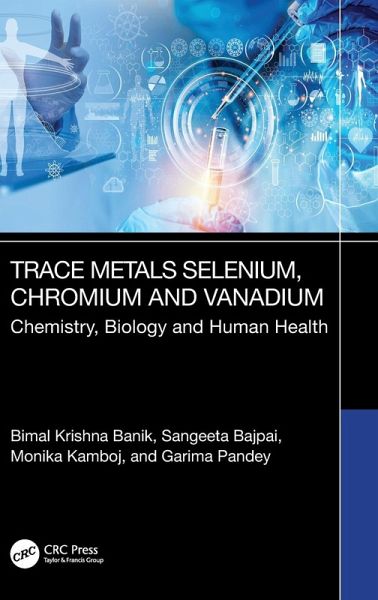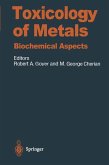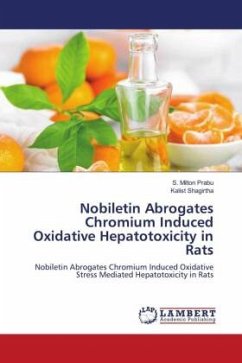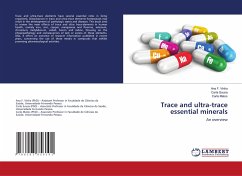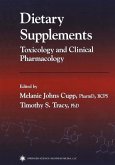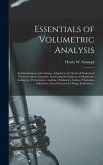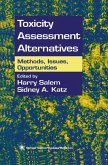Bimal Krishna Banik, Garima Pandey, Monika Kamboj, Sangeeta Bajpai
Trace Metals Selenium, Chromium and Vanadium: Chemistry, Biology & Human Health
Chemistry, Biology & Human Health
Bimal Krishna Banik, Garima Pandey, Monika Kamboj, Sangeeta Bajpai
Trace Metals Selenium, Chromium and Vanadium: Chemistry, Biology & Human Health
Chemistry, Biology & Human Health
- Gebundenes Buch
- Merkliste
- Auf die Merkliste
- Bewerten Bewerten
- Teilen
- Produkt teilen
- Produkterinnerung
- Produkterinnerung
Trace elements Selenium, Vanadium and Chromium play an essential role in the nutrition of both animals and humans. Their accumulation in various environments and the subsequent transition of these elements into the food chain significantly affect human and environmental health.
Andere Kunden interessierten sich auch für
![Toxicology of Metals Toxicology of Metals]() Toxicology of Metals75,99 €
Toxicology of Metals75,99 €![Nobiletin Abrogates Chromium Induced Oxidative Hepatotoxicity in Rats Nobiletin Abrogates Chromium Induced Oxidative Hepatotoxicity in Rats]() S. Milton PrabuNobiletin Abrogates Chromium Induced Oxidative Hepatotoxicity in Rats40,99 €
S. Milton PrabuNobiletin Abrogates Chromium Induced Oxidative Hepatotoxicity in Rats40,99 €![Trace and ultra-trace essential minerals Trace and ultra-trace essential minerals]() Ana F. VinhaTrace and ultra-trace essential minerals24,99 €
Ana F. VinhaTrace and ultra-trace essential minerals24,99 €![Dietary Supplements Dietary Supplements]() Dietary Supplements161,99 €
Dietary Supplements161,99 €![Essentials of Volumetric Analysis; an Introduction to the Subject, Adapted to the Needs of Students of Pharmaceutical Chemistry, Embracing the Subjects of Alkalimetry, Acidimetry, Precipitation, Analysis, Oxidimetry, Indirect Oxidation, Iodometry, ... Essentials of Volumetric Analysis; an Introduction to the Subject, Adapted to the Needs of Students of Pharmaceutical Chemistry, Embracing the Subjects of Alkalimetry, Acidimetry, Precipitation, Analysis, Oxidimetry, Indirect Oxidation, Iodometry, ...]() Essentials of Volumetric Analysis; an Introduction to the Subject, Adapted to the Needs of Students of Pharmaceutical Chemistry, Embracing the Subjects of Alkalimetry, Acidimetry, Precipitation, Analysis, Oxidimetry, Indirect Oxidation, Iodometry, ...40,99 €
Essentials of Volumetric Analysis; an Introduction to the Subject, Adapted to the Needs of Students of Pharmaceutical Chemistry, Embracing the Subjects of Alkalimetry, Acidimetry, Precipitation, Analysis, Oxidimetry, Indirect Oxidation, Iodometry, ...40,99 €![Metals in Medicine Metals in Medicine]() Metals in Medicine262,99 €
Metals in Medicine262,99 €![Toxicity Assessment Alternatives Toxicity Assessment Alternatives]() Toxicity Assessment Alternatives112,99 €
Toxicity Assessment Alternatives112,99 €-
-
-
Trace elements Selenium, Vanadium and Chromium play an essential role in the nutrition of both animals and humans. Their accumulation in various environments and the subsequent transition of these elements into the food chain significantly affect human and environmental health.
Hinweis: Dieser Artikel kann nur an eine deutsche Lieferadresse ausgeliefert werden.
Hinweis: Dieser Artikel kann nur an eine deutsche Lieferadresse ausgeliefert werden.
Produktdetails
- Produktdetails
- Verlag: Taylor & Francis Ltd
- Seitenzahl: 256
- Erscheinungstermin: 7. Juli 2025
- Englisch
- Abmessung: 234mm x 156mm
- ISBN-13: 9781032613710
- ISBN-10: 1032613718
- Artikelnr.: 72699818
- Herstellerkennzeichnung
- Libri GmbH
- Europaallee 1
- 36244 Bad Hersfeld
- gpsr@libri.de
- Verlag: Taylor & Francis Ltd
- Seitenzahl: 256
- Erscheinungstermin: 7. Juli 2025
- Englisch
- Abmessung: 234mm x 156mm
- ISBN-13: 9781032613710
- ISBN-10: 1032613718
- Artikelnr.: 72699818
- Herstellerkennzeichnung
- Libri GmbH
- Europaallee 1
- 36244 Bad Hersfeld
- gpsr@libri.de
Professor Bimal Krishna Banik has a remarkable career, spanning significant achievements in teaching, research, mentoring, and professional service. He completed his Ph. D. degree in Chemistry from the Indian Association for the Cultivation of Science, Calcutta. Then, he pursued postdoctoral research at Case Western Reserve University, Ohio and Stevens Institute of Technology, New Jersey. Dr. Banik was a Tenured Full Professor in Chemistry and First President's Endowed Professor in Science & Engineering at the University of Texas-Pan American. He was the Vice President of Research & Education Development at the Community Health Systems of Texas. Currently, Dr. Banik is a Full Professor at the Prince Mohammad Bin Fahd University, Kingdom of Saudi Arabia. Notably, he has been selected as a Fellow of Five International Scientific Societies and has been designated as a Distinguished Researcher/Distinguished Scientist. Professor Banik is engaged in synthetic chemistry and medicinal research on cancers, antibiotics, natural products, hormones, and catalysis. His extensive and impactful contributions are reflected through $7.25 million grants from US NIH, US NCI and US Private Foundations as principal investigator. Dr. Banik is the Author of more than 740 publications including books, book chapters, name reactions, perspectives, reviews and papers with more than 10,000 citations. In addition, he has 520 presentation abstracts. Many of his international presentations at various conferences have been designated as Keynote and Plenary Lectures. Notably he has authored and edited 23 books and these are published by Elsevier, Springer, Springer Nature, CRC Taylor & Francis, De Gruyter, ICS, PMU and Nova. Dr. Banik's leadership roles in organizing International & National Conferences highlight his influence on scientific communities. He chaired 20 symposiums at the American Chemical Society National Meetings and over 2 dozen conferences at the International level, including 1 at the Nobel Prize Celebration Meeting in Germany. As the capacity of the Chair, he was able to introduce approximately 300 speakers. He has been deeply involved in the publication process of other authors. For example, Dr. Banik has been a reviewer of 93, editorial board member of 28, editor-in-chief of 12, founder of 8, and guest editor of 10 research journals. Due to his leading role in journals administration, Dr. Banik has recruited approximately 200 associate editors and editorial board members for journals. Importantly, he has served as a reviewer of NSF, NIH-NCI, NRC, ACS, US Research Corporation and International grant applications. Dr. Banik has evaluated approximately 2500 research grants and manuscripts. He was the Chair of the M.D. Anderson Cancer Center's drug discovery symposiums and Director of their analytical chemistry laboratory. He served as a Chair/Member of more than 100 committees; Reviewer of Promotion & Tenure of Faculties of USA and International Universities; Chair of the Faculty Research Council of the UTPA, and an Examiner of Doctoral Thesis. Professor Banik has been involved in teaching science, medical and engineering students on a regular basis for the past many years. He has taught more than 3000 students in the USA and in Saudi Arabia. His brilliant teaching skills were reflected and proven in several thousand students', peers', and administrators' outstanding evaluations as well as by independent comments posted on the "Rate My Professor" Website by the USA students. Numerous distinguished leaders in USA Universities constantly rated Dr. Banik as a "Truly Exceptional Teacher" and "Excellent Teacher" by scaling him within excellent, good, average, and weak for the past many years. He has established two science societies that have 1400 students at the University of Texas. Many research students from his group have received Ph. D., M. D., D. D. S., D. Pharm., M. D. Ph. D., M. S. and P. A. Degrees from USA Universities. Some of his students are working as University/Hospital Faculty Member; Clinician; Director; and Principal Scientist of Pharmaceutical/Chemical Companies in the World. Dr. Banik has mentored 20 postdoctoral fellows, 8 research scientists and approximately 300 students in research. Importantly, he has mentored 28 faculty members in his research also. Professor Banik was honored with several prestigious awards. He is consistently ranked among the Top 2% Researchers in the World. He received the Indian Chemical Society's Life-Time Achievement Award; Mahatma Gandhi Pravasi Honor Medal from the UK Parliament; US National Society of Collegiate Scholars' Best Advisor Award for students; Professor P. K. Bose Endowment Medal; Dr. M. N. Ghosh Gold Medal; University of Texas Board of Regents' Outstanding Teaching Award; ACS Member Service Award; and Best Researcher, Teacher and Mentor Awards by the UTPA. He is recognized by Burdwan University and Itachuna College as Distinguished Eminent Alumni and also by ACS News, Elsevier, RSC, US NCI, US Research Foundation, University of Texas Board of Regents, Times of India, Stevens Institute of Technology, ACS SEED, NCI, NIH, India and US Newspapers, and Down to the Earth Magazine. Dr. Banik received 200 invitations to deliver international lectures. He is also invited to write books by almost all most reputed publishers in the World. Dr. Sangeeta Bajpai is a faculty of Chemistry, working with Amity University, Lucknow, India for the last 17 years. She has 30 years of Academic Research experience. She was awarded doctorate degree in Chemistry from Lucknow University in the year 1998. Her academic journey includes more than 50 research publications in various journals of National and International Repute, various authored and edited books, book chapters with National and International Publishers (Elsevier, Bentham and De-Gruyter Publisher). She has participated in various International and National conferences as Invited speaker. As the Principal Investigator, she completed two major research projects (Fast Track Young Scientist Women Scientist). They were duly funded from Department of Science & Technology, INDIA. She has been a Lifetime Member of reputed organizations, Indian science congress, Association of Chemistry Teachers and Editorial board member of reputed scientific journals. Under her supervision, two students have been awarded their Ph.D. degree. Many more students are pursuing their research work under her guidance. Her research areas of interests include Organometallic Chemistry, Coordination Chemistry, Supramolecular Chemistry, Green Chemistry and Macrocyclic Chemistry. She has been engaged in the chemistry of organotellurium compounds mainly to explore newer bonding perspectives in its complexes via spectral and X-ray diffraction studies. Dr. Monika Kamboj, a faculty of Chemistry, working with Amity University, Lucknow, India for the last 15 years. She was awarded a doctorate in Chemistry from the National Institute of Technology Kurukshetra in 2012. Her academic journey includes more than 40 research publications in various journals of National and International Repute and authored book chapters with National and International Publishers. She has participated in various International and National conferences as an oral paper presenter, poster presenter, and faculty development program. She was awarded the DR R K Aggarwal Award 2016 for best poster presentation by the Indian Council of Chemists, India. Also received third prize in oral presentation at international conference Chemical Sciences: National and Global Prospective 2018 held at Lucknow. She has to her credit the prestigious Indian Academics Summer Research Fellowship 2024. Lifetime Memberships with reputed organizations, the Indian Science Congress, the Association of Chemistry Teachers and Indian Society for Photochemical and Radiation Sciences, Editorial board members, and reviewers of reputed scientific journals are also included to her credit. Under her supervision, one student has been awarded his Ph.D. degree. Her area of interest is Coordination Chemistry, Green Chemistry, and Macrocyclic Chemistry. Her research area includes the chemistry of Macrocyclic metal complexes, their characterization, and biological aspect. Dr. Garima Pandey is an Associate Professor in the Department of Chemistry, at the SRM Institute of Science and Technology, Modinagar, Ghaziabad. She received her doctorate in coordination chemistry in the year 2008. Dr. Garima has a rich teaching experience of more than 15 years with core areas being coordination chemistry, nanotechnology environmental chemistry and education. Dr. Pandey has more than 30 publications in various national and international journals of world repute, has attended more than 20 national and international conferences, workshops, symposiums and faculty development programs. All the way through her career, she has taken up a number of challenging assignments serving in the capacities of a teacher, counselor, mentor, anti-ragging committee member and girls hostel warden. As a core member of Women Grievance Cell she is always working towards promoting a healthy working environment for the female staff, students and faculty, building a gender-sensitized environment at the institute, organizing workshops and awareness programs towards building a gender-neutral workplace. She has always earned appreciation for her active involvement in student welfare, community- development and women empowerment programs.
SECTION 1
Chemistry (elemental properties, coordination chemistry and heterocyclic
chemistry) of Se, V & Cr.
Chapter 1: Chemistry of Selenium
Monika Kamboja*, Sangeeta Bajpaia, Garima Pandeyb and Bimal Krishan Banikc*
Chapter 2: Chemistry of Vanadium
Sangeeta Bajpaia*, Monika Kamboja Garima Pandeyb and Bimal Krishan Banikc*
Chapter 3: Chemistry of Chromium
Garima Pandeya* Sangeeta Bajpaib Monika Kambojb and Bimal Krishan Banikc*
SECTION 2
Biological properties of Se, V & Cr.
Chapter 4: Biological Properties of Selenium
Monika Kamboja*, Sangeeta Bajpaia, Garima Pandeyb and Bimal Krishan Banikc*
Chapter 5: Biological Properties of Vanadium
Sangeeta Bajpaia*, Monika Kamboja Garima Pandeyb and Bimal Krishan Banikc*
Chapter 6: Biological Properties of Chromium
Garima Pandeya* Sangeeta Bajpaib Monika Kambojb and Bimal Krishan Banikc*
SECTION 3
Role of trace metals (Se, V & Cr) on human health
Chapter 7: Effect of Selenium and Its compounds on human health
Monika Kamboja*, Sangeeta Bajpaia, Garima Pandeyb and Bimal Krishan Banikc*
Chapter 8: Role of Vanadium compounds on Human health.
Sangeeta Bajpaia*, Monika Kamboja Garima Pandeyb and Bimal Krishan Banikc*
Chapter 9: Chromium compounds and their interaction with mankind
Garima Pandeya* Sangeeta Bajpaib Monika Kambojb and Bimal Krishan Banikc*
Chemistry (elemental properties, coordination chemistry and heterocyclic
chemistry) of Se, V & Cr.
Chapter 1: Chemistry of Selenium
Monika Kamboja*, Sangeeta Bajpaia, Garima Pandeyb and Bimal Krishan Banikc*
Chapter 2: Chemistry of Vanadium
Sangeeta Bajpaia*, Monika Kamboja Garima Pandeyb and Bimal Krishan Banikc*
Chapter 3: Chemistry of Chromium
Garima Pandeya* Sangeeta Bajpaib Monika Kambojb and Bimal Krishan Banikc*
SECTION 2
Biological properties of Se, V & Cr.
Chapter 4: Biological Properties of Selenium
Monika Kamboja*, Sangeeta Bajpaia, Garima Pandeyb and Bimal Krishan Banikc*
Chapter 5: Biological Properties of Vanadium
Sangeeta Bajpaia*, Monika Kamboja Garima Pandeyb and Bimal Krishan Banikc*
Chapter 6: Biological Properties of Chromium
Garima Pandeya* Sangeeta Bajpaib Monika Kambojb and Bimal Krishan Banikc*
SECTION 3
Role of trace metals (Se, V & Cr) on human health
Chapter 7: Effect of Selenium and Its compounds on human health
Monika Kamboja*, Sangeeta Bajpaia, Garima Pandeyb and Bimal Krishan Banikc*
Chapter 8: Role of Vanadium compounds on Human health.
Sangeeta Bajpaia*, Monika Kamboja Garima Pandeyb and Bimal Krishan Banikc*
Chapter 9: Chromium compounds and their interaction with mankind
Garima Pandeya* Sangeeta Bajpaib Monika Kambojb and Bimal Krishan Banikc*
SECTION 1
Chemistry (elemental properties, coordination chemistry and heterocyclic
chemistry) of Se, V & Cr.
Chapter 1: Chemistry of Selenium
Monika Kamboja*, Sangeeta Bajpaia, Garima Pandeyb and Bimal Krishan Banikc*
Chapter 2: Chemistry of Vanadium
Sangeeta Bajpaia*, Monika Kamboja Garima Pandeyb and Bimal Krishan Banikc*
Chapter 3: Chemistry of Chromium
Garima Pandeya* Sangeeta Bajpaib Monika Kambojb and Bimal Krishan Banikc*
SECTION 2
Biological properties of Se, V & Cr.
Chapter 4: Biological Properties of Selenium
Monika Kamboja*, Sangeeta Bajpaia, Garima Pandeyb and Bimal Krishan Banikc*
Chapter 5: Biological Properties of Vanadium
Sangeeta Bajpaia*, Monika Kamboja Garima Pandeyb and Bimal Krishan Banikc*
Chapter 6: Biological Properties of Chromium
Garima Pandeya* Sangeeta Bajpaib Monika Kambojb and Bimal Krishan Banikc*
SECTION 3
Role of trace metals (Se, V & Cr) on human health
Chapter 7: Effect of Selenium and Its compounds on human health
Monika Kamboja*, Sangeeta Bajpaia, Garima Pandeyb and Bimal Krishan Banikc*
Chapter 8: Role of Vanadium compounds on Human health.
Sangeeta Bajpaia*, Monika Kamboja Garima Pandeyb and Bimal Krishan Banikc*
Chapter 9: Chromium compounds and their interaction with mankind
Garima Pandeya* Sangeeta Bajpaib Monika Kambojb and Bimal Krishan Banikc*
Chemistry (elemental properties, coordination chemistry and heterocyclic
chemistry) of Se, V & Cr.
Chapter 1: Chemistry of Selenium
Monika Kamboja*, Sangeeta Bajpaia, Garima Pandeyb and Bimal Krishan Banikc*
Chapter 2: Chemistry of Vanadium
Sangeeta Bajpaia*, Monika Kamboja Garima Pandeyb and Bimal Krishan Banikc*
Chapter 3: Chemistry of Chromium
Garima Pandeya* Sangeeta Bajpaib Monika Kambojb and Bimal Krishan Banikc*
SECTION 2
Biological properties of Se, V & Cr.
Chapter 4: Biological Properties of Selenium
Monika Kamboja*, Sangeeta Bajpaia, Garima Pandeyb and Bimal Krishan Banikc*
Chapter 5: Biological Properties of Vanadium
Sangeeta Bajpaia*, Monika Kamboja Garima Pandeyb and Bimal Krishan Banikc*
Chapter 6: Biological Properties of Chromium
Garima Pandeya* Sangeeta Bajpaib Monika Kambojb and Bimal Krishan Banikc*
SECTION 3
Role of trace metals (Se, V & Cr) on human health
Chapter 7: Effect of Selenium and Its compounds on human health
Monika Kamboja*, Sangeeta Bajpaia, Garima Pandeyb and Bimal Krishan Banikc*
Chapter 8: Role of Vanadium compounds on Human health.
Sangeeta Bajpaia*, Monika Kamboja Garima Pandeyb and Bimal Krishan Banikc*
Chapter 9: Chromium compounds and their interaction with mankind
Garima Pandeya* Sangeeta Bajpaib Monika Kambojb and Bimal Krishan Banikc*

